The 10 Best CRMs for E-Commerce Reviewed for 2024
The aim of increasing client retention, sales, and automation to enhance corporate growth is a common goal throughout the many industries that employ CRMs. The best e-commerce CRM software can assist in achieving these objectives while also enhancing teamwork and collaboration.
CRMs are an incredibly important tool for helping e-commerce businesses better understand their customer’s behavior, browsing, and spending patterns, enabling them to increase their chances of making a sale.
To help you find the best of the bunch for your needs, we explore the market’s 10 best CRMs for e-commerce, looking at a variety of factors like features, integrations, and price.
The Best CRMs for E-Commerce In 2024
Below is a quick glance at our top 10 list. We’ll be reviewing all the providers below shortly. As you can see, Salesforce has come out on top, and we particularly like the wide range of features on offer, alongside some truly competitive pricing:
- Salesforce – Overall, the best CRM for online stores as it boasts a ton of third-party integrations and premium sales and marketing features
- Pipedrive – Includes a host of advanced features like Shopify support, detailed analytics, and customized dashboards
- Zoho CRM – Leading budget-friendly CRM with a range of affordably priced plans and powerful e-commerce-focused features like sales forecasting
- Monday Sales CRM – A reliable and user-friendly CRM system that’s great for first-time users
- HubSpot – One of the best free CRMs for e-commerce businesses as the free forever plan boasts unlimited users
- Freshsales – Top choice for sales teams as it includes a built-in phone system for monitoring sales calls
- Zendesk – A customer-focused solution that comes with a helpdesk solution that’s ideal for remote working e-commerce businesses
- Maximizer CRM – Offers excellent sales and marketing features aimed at catapulting online sales
- Less Annoying CRM – One of the most simple CRM systems to use, ideal for startup e-commerce businesses and CRM newbies
- Act! – A solid CRM platform that offers excellent 24/7 customer service, automation, and great customization capabilities
Reviews of the Best CRM for E-Commerce in 2024
Now let’s take a look at the top 10 providers in more detail, starting with our number one pick, Salesforce, which is the best overall CRM provider for 2024.
1. Salesforce – Overall, the Best CRM for Online Stores
One of the most widely used CRM solutions in both B2B and B2C sectors is Salesforce. It’s made to assist companies in uniting their sales, marketing, IT, commerce, and service teams so that everyone can operate smoothly and work collaboratively from any place.
Through a wide range of tools for sales, marketing, and customer service, the software effectively links teams with customers, leads, and partners. Companies in both the B2B and B2C sectors can effortlessly manage their sales and marketing pipelines, target their target markets and cooperate internally with the help of Salesforce CRM.
The software is adaptable and simple to use, making it the perfect CRM option for expanding online retailers and e-commerce companies.

Users get access to pertinent client data using Salesforce CRM, including contact details and correspondence history, which aids customer care and support staff in maximizing their interactions with loyal and repeat customers.
The cloud-based software also enables users to maintain track of ongoing negotiations and their various stages while viewing a complete timeline of their client’s behavior. Beyond this, sales teams can create and manage quotations and orders.
According to key performance indicators (KPIs) and other valuable information, the program can offer various estimates for sales, subscriber retention, email engagement, and revenue. Plus, companies can build workflows for automated business operations that include human tasks like writing unique proposals.
To top it off, there’s an extraordinary amount of third-party connections available, and it’s simple to look for add-ons or other platforms that you may connect to. Today, Salesforce has over 3,000 integrations, allowing you to find alternative platforms that can improve your business operations.
Salesforce has the ability to link with the top platforms uses for the majority of objectives, from marketing automation to scheduling software. The likes of Slack, Calendly, DocuSign, QuickBooks, LinkedIn, HubSpot, and much more are all available at the click of a few buttons.
Pricing
There are a few different price plans on offer from Salesforce that make them suitable for e-commerce businesses of all sizes and scalability, with the cheapest being the Essentials plan, which starts from just $25/month:
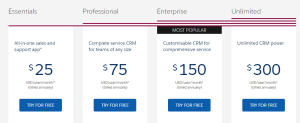
If your e-commerce business grows, it’s important that your CRM has the ability to grow alongside you. Salesforce has a number of upgrade options that include premium features like customer journey analytics, advanced reporting, and custom code development.
| Starting Price | Free Version | Integrations | Supported Devices | Top Features |
| $25/month | No | 3,000+ | Windows, Mac, Android, and iOS | 1. Forecast Management
2. Marketing Campaign Management 3. Lead Auto-assignment |
Pros
- A huge range of integrations with third-party apps
- Affordably priced plans for businesses of all sizes
- Widely customizable dashboards and interface
- Useful 30-day free trial to test the service out
- Excellent lead management and scoring features
Cons
- No free plan is available, only a free trial
2. Pipedrive – Feature-Rich Sales CRM, Perfect for E-Commerce Businesses
While Pipedrive is primarily a sales CRM and deal monitoring system, it can be used for a variety of purposes that are pertinent to an online e-commerce organization. For recording sold items and their data, such as unit prices, category, tax rates, and any other custom fields you want to add, the products catalog is very useful.
This is especially helpful for tracking consumer behavior, such as previous purchases, to help with personalized promotions or recommendations. As a sales-focused CRM solution that has an easy-to-use interface, it enables you and your team to get practical information and send personalized messages with ease.
This is particularly important for smaller e-commerce firms. In fact, Pipedrive is one of the best contact management software solutions for individuals that require sophisticated data management solutions in their e-commerce CRM.

Teams can automatically add internet data to their customer profiles, look for duplicate records, keep tabs on interaction and purchase activity, connect pertinent files, and check customer locations on Google Maps inside a contact record.
But don’t be fooled by its apparent simplicity; Pipedrive is one of the most complete CRM solutions available, and with more than 150 apps and integrations, it’ll almost certainly function without a hitch with your current setup.
Pipedrive shines as a sales-focused CRM, and the capabilities it offers are consistent with this. Contacts may be created and tracked all the way through the sales pipeline, from the first conversation to the last transaction and beyond.
Automation helps eliminate a lot of the tedious busywork that would otherwise take up employees’ time and allows each step of the process to be customized to the needs of certain teams.
Pricing
Pipedrive offers one of the most budget-friendly and comprehensive CRM software solutions for businesses of all sizes. With four different plans to choose from, there’s something for everyone:

Pipedrive offers a number of different price plans should you need to upgrade to fit your e-commerce business demands. With the higher tier plans, you can get access to more advanced features like API access, custom integrations, and 24/7 customer support.
| Starting Price | Free Version | Integrations | Supported Devices | Top Features |
| $12.50/month | No | 400+ | Windows, Mac, Android, and iOS | 1. Customizable Workflows
2. Chatbots 3. Machine learning-powered sales assistant |
Pros
- Well-priced plans to suit a range of businesses
- The useful Chatbot feature is great for use in e-commerce
- Includes a built-in product catalog to track items you sell on your website
- Highly customizable system to tailor for e-commerce informational requirements
Cons
- No free plan
3. Zoho CRM – Leading Budget-Friendly CRM for Online Stores
Zoho CRM is an ideal e-commerce CRM which unifies customer, marketing, and inventory management. Users that combine it with e-commerce applications like Shopify have access to crucial capabilities for launching campaigns, keeping track of inventory, processing orders, and monitoring customer behavior.
It’s designed to be an all-in-one sales, service, and marketing platform as it interacts with Shopify to synchronize customer data between the two platforms and provides an integrated project management tool for organizing campaigns, product launches, or the processes involved in developing new products.

It offers an integrated inventory management system in addition to its numerous modules and integration possibilities. Since you can manage orders, vendors, product lines, and inventory stock in the same interface where you’re conducting your marketing campaigns and sales outreach, this functionality is very helpful for e-commerce.
Any third-party software you may already be using, such as Mailchimp, Google Analytics, and QuickBooks, can be seamlessly integrated with Zoho CRM, and it supports a ton of integrations with popular e-commerce software, accounting software, and so much more.
Also, there is an excellent sales automation tool that helps you generate leads using forms on your website, social media, and email, and these prospects are then included as contacts in your CRM. We believe that Pipeline is one of the top CRM marketing automation tools out there.
Pricing
Below are four main paid plans that can be used if you need to upgrade or scale your e-commerce business. Plus, there’s a generous 45-day money-back guarantee for those who signup for a paid plan. The other plans are as follows:

Zoho CRM has a host of plans to fit all business needs, and when the time comes for your business to grow, they’ve got you covered. The more premium plans include useful features like Google Suite integrations, lead scoring, and sales signals that’ll give your e-commerce platform more room to grow and scale up.
| Starting Price | Free Version | Integrations | Supported Devices | Top Features |
| $20/month | Free Forever Plan | 150+ | Windows, Mac, Android, and iOS | 1. Sales Automation
2. Mobile Apps 3. Inventory Management |
Pros
- All-in-one sales, marketing, service, and project management system
- Has a Zoho-Shopify extension that syncs Shopify customers to Zoho records in the CRM
- Includes an inventory management tool for tracking orders, creating product logs, and managing vendors
- Great 24/7 customer service
Cons
- Social media management is a paid add-on
4. Monday Sales – A Reliable and User-Friendly CRM System
Monday Sales CRM may lack integrated operations management tools for keeping track of inventories, handling payments, and tracking orders, however, it’s extremely versatile and can be used across various industries.
The flexibility that’s on offer is just one of the reasons why we ranked Monday Sales as one of the best CRMs for small businesses. Online shops can use this CRM for data storage, task automation, and communications thanks to its email tools, no-code automation, and basic data management features.
You can store an unlimited number of items, such as customer records, in Monday Sales CRM and see them on any type of board view, such as a table, Kanban, Gantt, or timeline. As long as the data is kept in the CRM, users can also design dashboards to suit any purpose.
In order to manage orders, clients, and revenue on a single CRM dashboard, you can do this by applying reporting to e-commerce activities.
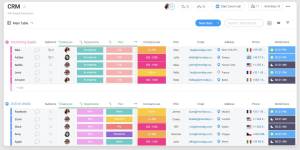
Given that it enters and manages data in a spreadsheet format similar to Excel, Monday Sales CRM is an incredibly useful tool. Additionally, it provides no-code automation features that let users create automatons by choosing triggers, actions, and data records from prepared workflows.
This enables you to automate important data updates and drip email nurturing chores. Along with offering essential capabilities like sales pipeline and contact management, workflow automation, and email synchronization, Monday enables sales teams and managers the opportunity to customize almost every part of the CRM.
In addition to connecting to a number of connectors and the native API, this enables users to ensure that the CRM satisfies the unique requirements of their business. Plus, there’s also a respectable free forever plan that you can use to create rudimentary boards.
However, the free version is primarily intended for tiny enterprises or for a maximum of one or two users. Three boards, a Kanban view, an activity record for up to a week, and a few other fundamental functions are available.
Pricing
The free plan includes one dashboard for data visualization, up to two users, 1,000 contacts, 500MB of file storage, Kanban view, and access to online lead collection forms for up to two users. Paid options begin at $30 per month for the Basic option, with numerous other tiers available after that.
The price of the plan varies depending on the number of users (minimum of three) and the plan tier, and you may choose between monthly or annual billing. Join a 14-day free trial to gain a feel for the software. The whole list of plans is detailed below:

Alongside the excellent free plan on offer from Monday Sales is a number of more premium-priced plans. These are ideal for growing e-commerce businesses, right up to large corporations. For the extra monthly cost, you’ll get more storage, customizations, and integrations with other third-party software.
| Starting Price | Free Version | Integrations | Supported Devices | Top Features |
| $30/month | Free Forever Plan | 50+ | Windows, Mac, Android, and iOS | 1. Personalized Scaled Emails
2. Sales Leaderboard 3. Lead Scoring |
Pros
- Outstanding no-code automation tools for email outreach and data management workflows
- Simple product with spreadsheet-style data entry and board customization features
- Dependable dashboard reporting tools to track critical parameters and receive real-time performance information
- Excellent free forever plan that’s ideal for smaller e-commerce businesses
Cons
- Lacks e-commerce operational tools, including a module for inventory management and payment processing
5. HubSpot – One of the Best Free Ecommerce CRMs
HubSpot is a well-known brand in the marketing and e-commerce industries, and it provides a comprehensive set of free CRM tools and software that nearly entirely meet your needs for expanding your company.
For larger e-commerce enterprises willing to advance their business objectives, the premium version offers more potent features.
Without the inconvenience of moving between apps and paying several monthly payments, you’ll have access to things like project management, forecasting, contact tracking, scheduling, lead management, and financial CRM with Hubspot.

Users can collect and track digital payments in the HubSpot Sales Hub and CRM Suite, which expands the sales CRM with marketing and customer service tools. One choice is built-in processing, which enables automatic clearing house (ACH) payments for invoices.
For managing credit payments, Stripe is directly integrated as well. Beyond this, HubSpot is renowned for its straightforward CRM usage. It makes use of a contemporary interface and simple features to enable users of any technical skill level to rapidly understand and use the system.
Once they’re at ease, e-commerce teams may automate customer journeys from a single system, interact with e-commerce systems like Shopify, and build and deploy marketing campaigns.
Pricing
In contrast to other CRMs, which only offer a free trial, HubSpot offers a very generous free edition.
The only drawbacks that can be identified are the one-user account restriction and the absence of complex capabilities (teams, document storage, and website integration at the low end and automation and analytics at the high end). The other list of plans and costs can be found below:

HubSpot can be pretty expensive if you opt for the more premium packages, but it’s important to remember that they offer a full sales and marketing suite alongside the CRM, and for large businesses who want all the cutting edge-features like detailed user analytics and sales forecasting, it’s a no brainer.
| Starting Price | Free Version | Integrations | Supported Devices | Top Features |
| $25/user/month | Free Forever Plan | 300+ | Windows, Mac, Android, and iOS | 1. Website Activity Tracking
2. Email Integration & Tracking 3. Opportunity Pipeline |
Pros
- List segmentation, Facebook Messenger integration, and bulk email marketing are included in the free plan
- Includes integrated Stripe connectivity and built-in payment processing facilities
- Incredibly easy to use thanks to a user-friendly interface
- Integrates with a ton of third-party apps for an excellent e-commerce experience
Cons
- No inventory management features
6. Freshsales – Solid Pick for Sales Teams as it Includes a Built-In Phone System
Freshsales CRM is a great option for e-commerce organizations that want to manage their customer interactions and marketing from a single control panel because it is an all-in-one platform. It enables you to provide a personalized experience, keep track of consumer dialogues, and create contact databases.
It’s an easy-to-use CRM tool that is reasonably priced for small businesses that need to make wise financial choices. The free plan is an excellent place to start, and as your business grows, you can upgrade to one of the paid plans for more features.
Additionally, Freshsales provides AI-powered contact scoring and sales forecasting tools that let you track revenue growth in real time and make precise predictions about what will happen.
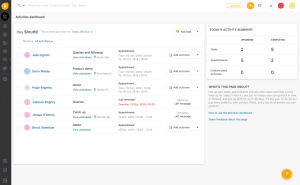
In order to track and increase their LTV from customers, the platform enables companies to establish customer lifecycle stages depending on the data and behavior of their customers.
Also, Freshsales can be tailored to reflect the local currency, which benefits global brands, and it can be applied to a variety of channels, such as WhatsApp, live chat, email, and the phone, to increase client interaction and reach.
A variety of third-party tools and platforms are available for integration with Freshsales. This enables you to have all of your client information in one location. There are integrations with marketing automation programs like HubSpot and Marketo, as well as email syncing options with Gmail, Outlook, and other email clients.
By integrating Slack, Gong, Google Workspace, and many more into the Freshworks platform, you can grow it as well. This makes integrating Freshsales with other software and devices you might already be using simple and straightforward.
Pricing
Freshsales offers a free version of its popular CRM software, plus three paid plans that are tailored to fit the needs of different businesses:

Freshsales offers four affordable plans that aim to grow alongside your business depending on your needs. In the more premium Pro and Enterprise plans, you’ll get access to 24/7 customer support and a ton of useful integrations with key e-commerce apps like Shopify.
| Starting Price | Free Version | Integrations | Supported Devices | Top Features |
| $15/month | Free Forever Plan | 50+ | Windows, Mac, Android, and iOS | 1. AI-powered Lead Scoring
2. Custom Dashboards & Reports 3. Built-in Phone |
Pros
- Incredibly easy-to-use dashboard and interface
- A useful free plan that’s ideal for smaller businesses or entrepreneurs
- Various integrations with third-party apps to improve functionality
- AI-powered lead scoring on all paid plans
Cons
- Customer support isn’t as good as it could be
7. Zendesk – Superb Tool for Customer Service
Zendesk Sell is a well-known CRM tool that gives companies the ability to plan, control, and improve their sales operations. Users can engage with their contacts by email, phone, or text while also being able to track prospects and sales tasks conveniently.
The teams who use direct sales strategies as part of their overall business plan benefit the most from using this CRM software.
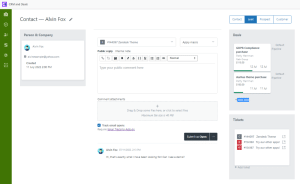
It’s a powerful, feature-rich platform to optimize sales and customer service procedures. The platform is made to be straightforward, user-friendly, and configurable so that your employees can interact with customers more successfully.
Zendesk makes it simple to build self-help sections and answer bots, view your customer care team, and track productivity all from a single interface. Using the Zendesk Sell mobile app, your sales force can access customer information and finalize deals while on the move.
Additionally, they may keep an eye on and track emails and get instant alerts when a prospect clicks or reads one. Your sales team can make the best judgments by remaining on top of the sales funnel since they have all the necessary information at their fingertips.
Pricing
Zendesk offers a decent range of plans for e-commerce businesses of all sizes, with the most basic offering starting at $19/month for one user. The rest of the plans are listed below.

Zendesk has a wide range of plans to support small, medium, and large e-commerce businesses, all of which integrate with the company’s helpdesk service. The more premium plans include useful sales and marketing features like customer behavior reports and detailed buyer analytics.
| Starting Price | Free Version | Integrations | Supported Devices | Top Features |
| $19/month | 30-day Free Trial | 50+ | Windows, Mac, Android, and iOS | 1. Smart Lists
2. Help Desk 3. Explorer Reports |
Pros
- Integrates well with Zendesks virtual desk support
- Easy-to-use interface
- Has a host of third-party integrations available
Cons
- Confusing price plans
8. Maximizer CRM – Top Choice for Sales and Marketing to Boost Online Revenue
Maximizer CRM excels in many different tasks. With three decades of knowledge and a vast array of online support services, it knows how to keep your business running smoothly. Its deployment is flexible, it is loaded with capabilities, and your staff will like its straightforward simplicity.
The negative? However, compared to some of the more lively, colorful dashboards of Zoho or Freshworks CRM, its interface does appear a touch dated. Additionally, Maximizer’s pricing options aren’t the most affordable ones available, which may eventually strain the finances of smaller companies.

Maximizer CRM offers solutions for sales management, marketing automation, customer service, and support, as well as business productivity. It also interfaces with Microsoft Office programs like Outlook, Word, Excel, and SharePoint.
The marketing automation component of the product includes email marketing campaigns, integrated campaign planning, and marketing analytics. Users can search and filter customer data using list management tools based on pre-set criteria, targeted leads, and customers.
Use the powerful analytics features of Maximizer to discover more about the performance of your business, as it enables you to monitor and assess activity in real time, so you can quickly decide how to proceed and adjust your plans as necessary.
Pricing
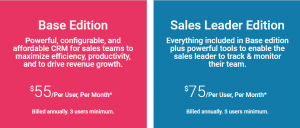
Pricing for Maximizer CRM is geared toward companies of all sizes. The Base Edition is a cost-effective option for companies just starting started with CRM and includes the necessary functionality to help you get going right away.
The Sales Leader Edition is a fantastic choice for more experienced customers and comes with extra features like automated lead tracking, sales analytics, and improved customer segmentation. Teams aiming to advance their sales process should use this strategy.
| Starting Price | Free Version | Integrations | Supported Devices | Top Features |
| $55.50/month | 30-day Free Trial | 500+ | Windows, Mac, Android, and iOS | 1. Contact Management
2. Third-party Integrations 3. Sales Forecasting |
Pros
- Generous 60-day money-back guarantee
- 30-day free trial on offer
- Excellent online customer support resources
Cons
- No free plan
9. Less Annoying CRM – One of the Most Simple CRM Systems
Less Annoying CRM is an ideal solution for small to midsize organizations or even startups. It is one of the most affordable options available and was created primarily to fulfill the needs of smaller businesses. It has a substantial feature set, an easy-to-use user interface, and great platform compatibility.
This platform boasts one of the most intuitive user interfaces in CRM, albeit lacking some advanced features and a dedicated mobile app. In terms of the software, it offers a simple dashboard with contacts, a calendar, tasks, and pipelines all in one place.
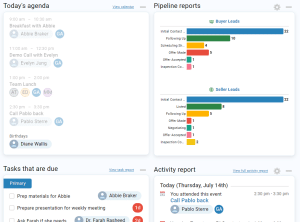
Any customization you like can be made to fields and pipelines. You may also integrate the essentials, such as Mailchimp, Google Contacts, Outlook, and Google Calendars, with Less Annoying CRM. Only a few outside apps are available for you to connect to.
less irritants Additionally, CRM will provide you with in-depth lead reports so you may always have a current overview of all the lists in your pipeline. You can then rapidly arrange the list by a lead's priority and status, and you can browse through any notes you took during that lead's most recent discussion.
Even though it is exceptionally clear-cut and easy to use, you can also add custom fields to your contacts and pipelines to improve the efficiency of your process. You can easily save, track, and organize your e-commerce platform in one place.
Pricing
Less Annoying CRM strives for simplicity, which is reflected in the transparent cost of the product. There is only one plan available at a monthly cost of $15 per user. Contacts are limitless under the plan. You can easily enjoy a 30-day trial with all the features without having to submit your financial information.

| Starting Price | Free Version | Integrations | Supported Devices | Top Features |
| $15/month | 30-day Free Trial | 100+ | Windows, Mac, Android, and iOS | 1. Unlimited Pipelines
2. Task Management 3. Email Logging |
Pros
- The newly redesigned interface is more intuitive
- Wide range of help and support options
- Great mobile website implementation
Cons
- Basic reporting features
10. Act! CRM – Solid CRM for Automation and Customization
Act! is aimed at small and midsize businesses looking to increase sales, increase customer loyalty, and improve marketing efficiency. It's a powerful e-commerce CRM and Marketing Automation tool in one platform.
Even though the Act! the program has evolved into a cloud application with a browser-based front end, but its user interface is still incredibly outdated.
Act!'s integrated email marketing tools may be exactly what your small to mid-size business needs to reach out to customers if you're ready to put up with its steep learning curve for the user interface.
Although some of its competitors prebuilt report templates are more aesthetically pleasing, the 30 that come with this one can be fully customized. The Marketing Automation option gives you access to email marketing software that is fully integrated into the Act! UI.
You may create digital marketing campaigns with the use of email templates, autoresponders, bulk monthly mailing schedules, and a visual workflow designer to automate each step. Customer management skills are another crucial factor.
ACT! gives businesses all the resources need to effectively manage their client relationships. This has a relationship history that allows companies to customize interactions with each individual customer and a powerful search that makes it simple to locate the customer's information quickly.
The software provides centralized customer data, where all client information is gathered in one place. Thanks to iOS and Android's offline and mobile access, you can even work while on the road.
Pricing
The plan pricing for Act! is pretty straightforward, and you get the choice of a cloud-based or on-premise option. Act! Premium Desktop for the cloud starts at $36/month, whereas the on-premise plan is $40/month. There are a number of paid add-ons, like Marketing Automation, Custom Tables, and Dual Access (Desktop Cloud Sync.)

| Starting Price | Free Version | Integrations | Supported Devices | Top Features |
| $36/month | 14-day Free Trial | 150+ | Windows, Mac, Android, and iOS | 1. Email Marketing
2. Custom Dashboards 3. 24/7 Support |
Pros
- Useful integrated email marketing features are solid
- Decent marketing automation workflow builder
- Relaible 24/7 customer support
Cons
- For Email integration, you need an external email client
- A slightly outdated interface can be clunky and confusing
Comparison of the Best Ecommerce CRMs
Below is a useful comparison table that allows you to easily see the key features, pricing, and device compatibility in one convenient location:
| Software | Starting Price | Top Features | Free Version | Compatibility | |
| Salesforce | $25/month | 1. Forecast Management
2. Marketing Campaign Management 3. Lead Auto-assignment |
No | Windows, Mac, Android, and iOS | |
| Pipedrive | $12.50/month | 1. Customizable Workflows
2. Chatbots 3. Machine learning-powered sales assistant |
No | Windows, Mac, Android, and iOS | |
| Zoho CRM | $20/month | 1. Sales Automation
2. Mobile Apps 3. Inventory Management |
Free Forever Plan | Windows, Mac, Android, and iOS | |
| Monday Sales | $30/month | 1. Personalized Scaled Emails
2. Sales Leaderboard 3. Lead Scoring |
Free Forever Plan | Windows, Mac, Android, and iOS | |
| HubSpot | $25/month | 1. Website Activity Tracking
2. Email Integration & Tracking 3. Opportunity Pipeline |
Free Forever Plan | Windows, Mac, Android, and iOS | |
| Freshsales | $15/month | 1. AI-powered Lead Scoring
2. Custom Dashboards & Reports 3. Built-in Phone |
Free Forever Plan | Windows, Mac, Android, and iOS |
|
| Zendesk | $19/month | 1. Smart Lists
2. Help Desk 3. Explorer Reports |
Yes | Windows, Mac, Android, and iOS | |
| Maximizer CRM | $55.50/month | 1. Contact Management
2. Third-party Integrations 3. Sales Forecasting |
30-day Free Trial | Windows, Mac, Android, and iOS | |
| Less Annoying CRM | $15/month | 1. Unlimited Pipelines
2. Task Management 3. Email Logging |
30-day Free Trial | Windows, Mac, Android, and iOS | |
| Act! CRM | $30/month | Contact Management | 14-day Free Trial | 1. Email Marketing
2. Custom Dashboards 3. 24/7 Support |
What is An E-Commerce CRM?
A CRM system is a hub or piece of software that you may use to store information about clients, accounts, leads, and other facts that can be used to support future sales possibilities.
Some e-commerce CRM solutions are advantageous for both small and large enterprises because they firmly store customer information in the "cloud," where it can be accessed by numerous users from a variety of mobile devices at any time, anywhere.
CRM is more crucial than ever for the mobile developer who has invested time, effort, and money into creating a responsive mobile e-commerce website. Sales on an e-commerce website with integrated CRM will aid in your understanding of your cross-channel clients and the factors that influence their purchasing decisions.
Key Benefits of CRM Software for Online Stores
There are a number of benefits of using CRM software for those in the e-commerce industry, including improved workflows and overall simplicity of sales. Below are a few of the other important factors.
- Simplicity: By creating a single location for customer information, communications, and sales data, you can streamline your sales process. Your sales team may be able to close deals more quickly and proficiently as a result.
- Collaboration: Data and communications about customers can be easily shared between teams and departments. This can enhance teamwork and guarantee that all parties are in agreement when it comes to consumer encounters.
- Automation: Automate a number of processes, including email sending, appointment setting, and lead follow-up. By doing so, you can save time and concentrate on activities that are more crucial
- Personalization: Utilise client data to segment and target your marketing initiatives for more individualized and successful campaigns. The more personal a campaign or email, the more likely you are to hook a customer and secure a sale.
- Support: By giving you access to client history and communications, you may better serve customers by responding to their wants and complaints in a timely and efficient manner.
Key Factors to Consider When Choosing the Best Ecommerce CRM
There are some key characteristics and functionalities you should consider, such as ease of use or connectors, to make sure you get the finest insurance CRM software for your business needs. We have created a list of things to watch out for to offer you some ideas:
- Ease-of-use: Your CRM system should be simple to use, much like your email application. Additionally, basic chores like updating contact information or monitoring sales should be simpler to complete.
- Manage Leads: You may track and identify your leads as they move through the sales cycle by using a lead management function. You can convert some leads into customers by rating your prospects and, if necessary, transferring them to another member of your team through the lead management process.
- Reporting & Analytics: Consumer analytics enables the comprehension of customer data. Such information is crucial since it can inform your choices on the categories of goods and services, marketing campaigns, and all other interactions with your clients.
- App Integration: You may be able to save a tonne of time and money by linking your CRM software with other programs you already use. The challenge is finding one that works with your current apps and is simple to operate. Most CRM software offers integration with hundreds of other tools for e-commerce.
Conclusion | What's the Best E-commerce CRM in 2024?
When assessing the best CRM software for e-commerce, we considered a tonne of different important aspects, such as functionality, customer service, usability, user experiences, and third-party connections. Overall, we think Salesforce is the best e-commerce CRM software available right now.
This is because it has a feature-rich plan that enables several third-party connections with programs like Shopify and Stripe and offers a tonne of premium features like Account and Case Management and Detailed Reports.
It's also a fantastic choice if your company has to scale up because it offers a selection of plans that develop together with your company.















